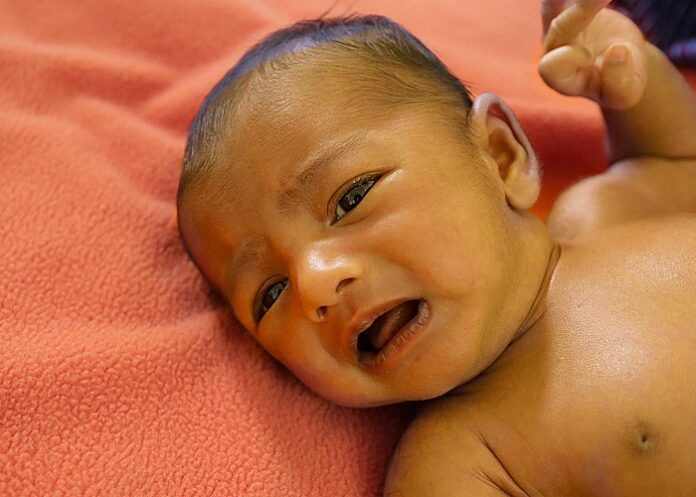Fosfomycin offers potential as an affordable antibiotic regimen with a simple dosing schedule for neonatal sepsis, under conditions of rising antimicrobial resistance (AMR), found the NeoFosfo trial in Kenya.
Fosfomycin is an antibiotic that is used in some countries to treat serious bacterial infections but has rarely been used for treatment of serious infection in babies admitted to hospitals. It is an off-patent antibiotic and thus potentially inexpensive, and has been identified as “critically important” by the World Health Organization (WHO).
The trial investigated the pharmacokinetics (PK) and safety of fosfomycin in 120 babies aged under 28 days who were hospitalised with clinically diagnosed sepsis at the Kilifi County Hospital in Kenya. The PK studies define which dose to use in babies.
The trial was sponsored by the Global Antibiotic Research and Development Partnership (GARDP) and the Drugs for Neglected Diseases initiative (DNDi) and supported by key partners, including the South Africa Medical Research Council (SAMRC).
“This is a very encouraging outcome for the treatment of neonatal sepsis and the care of babies who are hardest-hit by rising antimicrobial resistance (AMR),” said Sally Ellis, Neonatal Sepsis Project Leader for GARDP. “The study provides crucial evidence of the correct dosage of fosfomycin for newborns.”
A paper on the outcome of the trial, published in Archives of Diseases in Childhood, indicated that fosfomycin offered significant potential as part of a combination antibiotic regimen for newborns, which is safe, easily administered, and affordable.
The paper comes after recent data showed that Sub-Saharan Africa has the highest overall burden of AMR in the world, and that babies in particular are most affected. The GRAM study, published in The Lancet in January 2022, revealed that children under five years old made up more than half of the 255,000 people in Sub-Saharan Africa who died in 2019 because of AMR.
Neonatal sepsis is a life-threatening condition that requires prompt detection and treatment. Newborns – babies under 28 days old – are particularly vulnerable as their underdeveloped immune systems struggle to fight infections. This is complicated by drug resistance, as up to 40% of bacterial infections are resistant to standard treatments. Many newborns die if they don’t get timely treatment, while others may have significant long-term consequences.
“Currently there are very limited antibiotics in the pipeline. Safe and affordable antibiotic combinations effective against bacteria causing sepsis in babies are needed to improve survival. Our results are significant as they provide evidence that fosfomycin is safe and can now be taken forward into further clinical trials focusing on improving mortality outcomes for sepsis in babies,” said the trial’s clinical investigator, Christina Obiero, of the KEMRI-Wellcome Trust Research Programme in Kilifi, Kenya.
The results of the NeoFosfo trial will be followed by a large GARDP-led international clinical trial, NeoSep, which will enrol 3,000 babies, including in Kenya and South Africa. It will obtain robust evidence of the safety and efficacy of new antibiotic combinations including fosfomycin, compared with other WHO-recommended and existing antibiotic combinations, for the treatment of neonatal sepsis.
It is expected that results from this trial could inform WHO and local antibiotic treatment guidelines, as partners aim to demonstrate which combinations are safe and effective in treating neonatal sepsis.
Study details
Randomised controlled trial of fosfomycin in neonatal sepsis: pharmacokinetics and safety in relation to sodium overload
Christina W Obiero, Phoebe Williams, Sheila Murunga, Johnstone Thitiri, Raymond Omollo, Ann Sarah Walker, Thaddaeus Egondi, Borna Nyaoke, Erika Correia, Zoe Kane, Silke Gastine, Karin Kipper, Joseph F Standing, Sally Ellis, Mike Sharland, James Alexander Berkle.
Published in The Archives of Diseases in Childhood on 24 January 2022
Abstract
Objective
To assess pharmacokinetics and changes to sodium levels in addition to adverse events (AEs) associated with fosfomycin among neonates with clinical sepsis.
Design
A single-centre open-label randomised controlled trial.
Setting
Kilifi County Hospital, Kenya.
Patients
120 neonates aged ≤28 days admitted being treated with standard-of-care (SOC) antibiotics for sepsis: ampicillin and gentamicin between March 2018 and February 2019.
Intervention
We randomly assigned half the participants to receive additional intravenous then oral fosfomycin at 100 mg/kg two times per day for up to 7 days (SOC-F) and followed up for 28 days.
Main outcome(s) and measure(s)
Serum sodium, AEs and fosfomycin pharmacokinetics.
Results
61 and 59 infants aged 0–23 days were assigned to SOC-F and SOC, respectively. There was no evidence of impact of fosfomycin on serum sodium or gastrointestinal side effects. We observed 35 AEs among 25 SOC-F participants and 50 AEs among 34 SOC participants during 1560 and 1565 infant-days observation, respectively (2.2 vs 3.2 events/100 infant-days; incidence rate difference −0.95 events/100 infant-days (95% CI −2.1 to 0.20)). Four SOC-F and 3 SOC participants died. From 238 pharmacokinetic samples, modelling suggests an intravenous dose of 150 mg/kg two times per day is required for pharmacodynamic target attainment in most children, reduced to 100 mg/kg two times per day in neonates aged <7 days or weighing <1500 g.
Conclusion and relevance
Fosfomycin offers potential as an affordable regimen with a simple dosing schedule for neonatal sepsis. Further research on its safety is needed in larger cohorts of hospitalised neonates, including very preterm neonates or those critically ill. Resistance suppression would only be achieved for the most sensitive of organisms so fosfomycin is recommended to be used in combination with another antimicrobial.
AMR report on global burden in 2019
Archive of Diseases in Childhood article – Randomised controlled trial of fosfomycin in neonatal sepsis: pharmacokinetics and safety in relation to sodium overload (Creative Commons Licence)
See more from MedicalBrief archives:
UNICEF mortality estimates: Millions of children dying of preventable causes
Probiotic mixture reduces sepsis by 40% in infants
WHO report highlights lack of progress towards new antibiotics

